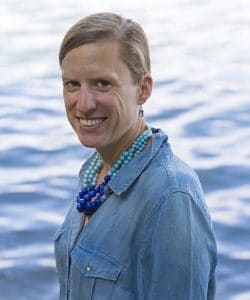This Winter Quarter the Writing, Rhetoric, and Discourse department is offering a particularly special guest speaker in our Writing & Rhetoric Across Borders series. Dr. Caroline Gottschalk Druschke is joining us from the University of Wisconsin-Madison to share her work in oral history. Her presentation “Living Well with Floods: Reciprocity, Research, and Refusal in Wisconsin’s Hill Country” gives a glimpse into stories she’s collected around dealing with ever-increasing floods and the mutual aid that takes place after disaster strikes.
Dr. Gottschalk Druschke is well-versed in ecological and water-based rhetoric as they have been focuses of hers for years. In fact, she leads a group of researchers in a program called Headwaters Lab through her university to study public engagement and freshwater ecosystems. The lab frames its work as being done “through a solid foundation in the study of rhetoric, we build critical theory and conduct social and ecological research about stream restoration, flooding, watershed-based agricultural conservation, and fisheries management. We take a community-based, equity-informed approach to better understand and intervene in dynamic, multispecies aquatic systems.”
In addition to her work as an Associate Professor of Composition & Rhetoric in the Department of English at the University of Wisconsin-Madison, she is also co-chair of Water@UW. Water@UW is a cross-disciplinary group of staff, faculty, and students from the university who are interested in building water research connections around the state.
Her presentation through the Across Borders series will focus on building community-driven flood models through narrative approaches along with relevant science to create more flood resilience in communities that have to live with frequent flooding. One of these areas is within the Upper Mississippi River Basin and projects like these make it possible for folks not just to live in a place, but to thrive there as a community.
Dr. Gottschalk Druschke will share pieces from her Stories of the Flood project. Stories of the Flood collects stories from people living with the consistent flooding in Wisconsin’s Driftless Area. The website collects stories to help the community grow together, help build a broader picture of what is happening in the area, help create plans to prevent/respond to flooding, educate those in power about what these increases of bad weather mean for people, and to archive the area’s history.
When asked about Stories of the Flood by Edge Effects in August 2021, Dr. Gottschalk Druschke said: “…The initial goal was to collect 200 stories and then eventually to deliver that archive, which we just did a few weeks ago, to the UW–La Crosse Oral History Program and the Vernon County Historical Society. Because of the complications of COVID, we were able to collect about a hundred oral histories that are now recorded, transcribed, indexed, and will be available to the public. The primary goal of the project was to support community healing through trauma, and the secondary goal of the project was to think about how those individual stories could potentially help to inform flood resilience planning moving forward.”
Learn more about Dr. Gottschalk Druschke’s work on these community-centric programs at our event. Her presentation will take place on Zoom on February 17, 2022, from 4:30 – 6 p.m. Register for the event here.
